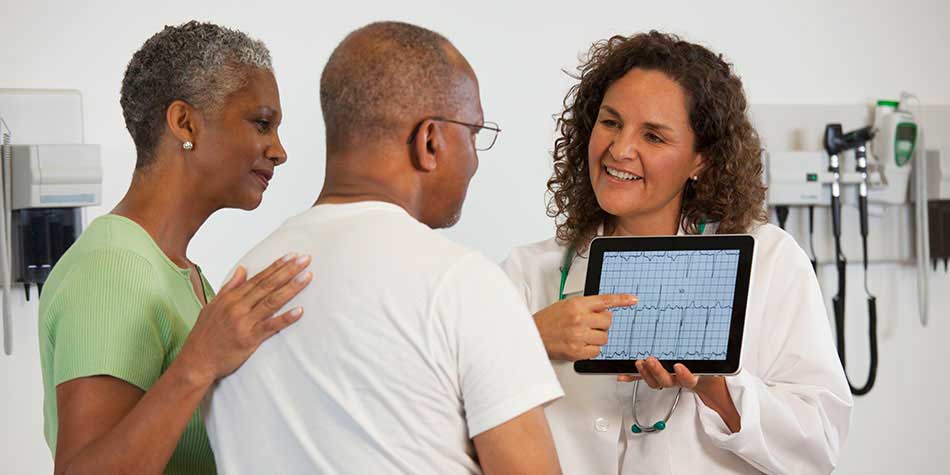Do you need to see an electrophysiologist?
- Posted On:
- Written By: Tulane Lakeside Hospital

A variety of problems can affect the heart’s size, shape and how well it’s able to function. These conditions range from high blood pressure and high cholesterol to coronary artery disease, valve damage and abnormal heartbeats, or arrhythmias.
For some of these issues, a primary care provider can provide good care. For others, a cardiologist will need to weigh in. If your heart turns out to have a complex problem with rhythm, though, you may be referred to an electrophysiologist—a specialist who focuses on the heart’s electrical system.
Types of heart specialists
All electrophysiologists (EPs) are cardiologists, but not all cardiologists are electrophysiologists. Cardiology can refer to general cardiology as well as to any of several subspecialties, including electrophysiology (EP).
In general, cardiologists help prevent and treat heart diseases, including heart attack, heart failure, valve problems and some arrhythmias. They commonly use electrocardiograms (EKGs), exercise tests and echocardiograms as diagnostic tools. They can also perform or recommend certain procedures, such as valve replacement, cardiac catheterization to diagnose and treat coronary artery disease, and heart surgery.
Electrophysiologists, as the name suggests, deal with electricity—specifically, with the electrical impulses in the heart that control its rhythm and trigger heartbeats. The electrophysiologist is trained to diagnose and treat arrhythmias.
This focus is why EPs are sometimes nicknamed “electricians,” while interventional cardiologists, for example—who work to ensure good blood flow—are known as the “plumbers.”
Electrophysiologists receive extra training
A cardiologist is a physician who, after completing medical school, has undergone three years of training in internal medicine followed by three more years of fellowship in cardiovascular disease.
After that, cardiologists may opt to train for an extra year or more to attain advanced certification. Their options include not only electrophysiology but also interventional cardiology, heart failure and transplant cardiology.
That means that, after college, electrophysiologists spend 11 to 12 years in training. Their final year or two gives them the added experience to manage arrhythmias that may challenge or stump other cardiologists.
Arrhythmias are electrophysiologists’ focus
Arrhythmias can originate along a variety of points in the heart’s electrical system, as well as from other parts of the heart. They include:
- Atrial fibrillation
- Atrial flutter
- Bradycardia, or low heart rate
- Sick sinus syndrome, which can lead to both atrial fibrillation/atrial flutter and bradycardia
- Tachycardia, or fast heart rate, of which there are a number of types
- Ventricular fibrillation (VF), a life-threatening “quivering” of the ventricles that can cause sudden cardiac death
- Premature ventricular contraction, in which the ventricles suddenly contract when receiving an abnormal early signal
- Heart block, in which electrical impulses originating from the upper chambers of the heart don’t reach the lower chambers as they should.
- Long QT syndrome, which can cause VF
- Brugada syndrome
- Wolff-Parkinson-White syndrome
- Arrhythmias relating to medication, pregnancy or abnormal metabolism
Arrhythmias can arise from long-standing heart conditions, including high blood pressure, as well as other issues, such as heart attack, injury, drug use or an electrolyte imbalance. Some heart rhythm disorders are linked to genetics or congenital heart defects.
Heart rhythm tests and treatments
To better understand and treat arrhythmias, the electrophysiologist can select any of a number of studies and treatments. There is some overlap between what they and other cardiologists do.
For example, as with any cardiologist, an electrophysiologist can do an EKG, which involves placing electrodes on the chest and monitoring the heart’s electrical activity. This recording can be extended for one or more days to capture infrequent arrhythmias.
Another test that both general cardiologists and electrophysiologists use is called the tilt-table test. In that test, patients lie on their back on a special table whose angle is changed, going from flat to upright. The doctor monitors heart rate and blood pressure to see how their heart adjusts to the tilt. This test may be chosen if a patient has fainting spells or nearly faints.
Electrophysiologists, on the other hand, are the experts at the electrophysiology study, in which they thread one or more catheters into the heart via a blood vessel in the groin, neck or arm. The catheters send electrical signals, and your heart’s response helps the doctor map out its electrical system.
The electrophysiology study may catch an important arrhythmia in real time. This in turn can shed light on the origin of an arrhythmia, the effects of certain medications, your prognosis and whether you’d be a good candidate for a pacemaker or other intervention.
Another typical electrophysiology procedure is cardiac ablation. This involves using electrodes to destroy specific spots on the heart where abnormal electrical signals are originating.
Electrophysiologists also insert, replace and communicate with cardiac implantable electric devices (CIEDs), including pacemakers, implantable cardioverter defibrillators (ICDs) and cardiac resynchronization therapy (CRT) devices.
Electrophysiologists may also shock the heart to restore normal rhythm, as can some other trained physicians.
When to call an electrophysiologist
If you have a heart problem, do you need to see a general cardiologist or a subspecialist like an electrophysiologist?
A primary care provider (PCP) is often a good first stop; depending on your problems, they may be all you need. PCPs typically can help you prevent and manage many problems that affect the heart, such as hypertension or diabetes. Your PCP can assess your heart and decide whether a cardiologist is better equipped to help.
Certain symptoms, such as chest pain, trouble breathing or dizziness—as well as certain findings like an abnormal EKG or a heart murmur—may prompt a PCP to refer you to a cardiologist.
That doctor can in turn decide whether EP subspecialty help is needed.